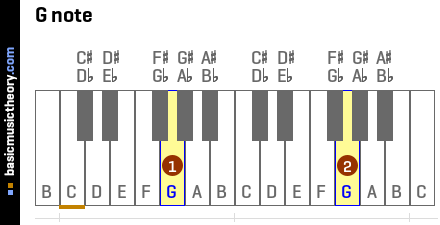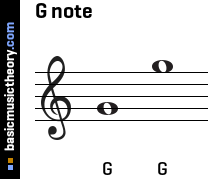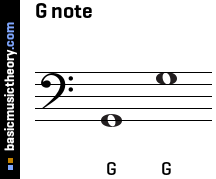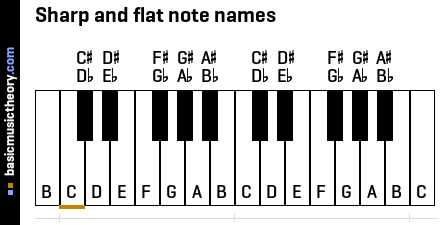G note
The Solution below shows the position of note G and G natural on the piano, treble clef and bass clef.
The Lesson steps then describe the note characteristics and relationship with the notes around it, and also lists which scales the note is in.
For a quick summary of this topic, have a look at Note name.
| Key | C | C# | Db | D | D# | Eb | E | E# | Fb | F | F# | Gb | [G] | G# | Ab | A | A# | Bb | B | B# | Cb |
|---|
Solution
1. G note
G is a white key on the piano.
Note G natural is exactly the same as note G.
It is called natural when an accidental instance of that note has already been indicated on the key signature or on the staff, (eg. G# or Gb), and that accidental needs to be cancelled, so the sharp or flat is not needed for the current note.

Middle C (midi note 60) is shown with an orange line under the 2nd note on the piano diagram.
These note names are shown below on the treble clef followed by the bass clef.


| Bass Clef: | Midi | MP3 | Treble Clef: | Midi | MP3 |
Lesson steps
1. Piano key note names
The white keys are named using the alphabetic letters A, B, C, D, E, F, and G, which is a pattern that repeats up the piano keyboard.
Every white or black key could have a flat(b) or sharp(#) accidental name, depending on how that note is used. In a later step, if sharp or flat notes are used, the exact accidental names will be chosen.

The audio files below play every note shown on the piano above, so middle C (marked with an orange line at the bottom) is the 2nd note heard.
| Bass Clef: | Midi | MP3 | Treble Clef: | Midi | MP3 |
2. G note
G is a white key on the piano.
Note G natural is exactly the same as note G.
It is called natural when an accidental instance of that note has already been indicated on the key signature or on the staff, (eg. G# or Gb), and that accidental needs to be cancelled, so the sharp or flat is not needed for the current note.
The next note up from G is G# / Ab.
Or put another way, G# / Ab is 1 half-tone / semitone higher than G.
The next note down from G is Gb / F#.
Or put another way, Gb / F# is 1 half-tone / semitone lower than G.

| Bass Clef: | Midi | MP3 | Treble Clef: | Midi | MP3 |
3. Note G is found in which scales ?
| G is the dominant of C major scale (fifth note) |
| G is the subdominant of D major scale (fourth note) |
| G is the mediant of Eb major scale (third note) |
| G is the supertonic of F major scale (second note) |
| G is the tonic of G major scale (first note) |
| G is the leading tone of Ab major scale (seventh note) |
| G is the submediant of Bb major scale (sixth note) |
| G is the dominant of C natural minor scale (fifth note) |
| G is the subdominant of D natural minor scale (fourth note) |
| G is the mediant of E natural minor scale (third note) |
| G is the supertonic of F natural minor scale (second note) |
| G is the tonic of G natural minor scale (first note) |
| G is the subtonic of A natural minor scale (seventh note) |
| G is the submediant of B natural minor scale (sixth note) |
| G is the dominant of C harmonic minor scale (fifth note) |
| G is the subdominant of D harmonic minor scale (fourth note) |
| G is the mediant of E harmonic minor scale (third note) |
| G is the supertonic of F harmonic minor scale (second note) |
| G is the tonic of G harmonic minor scale (first note) |
| G is the leading tone of Ab harmonic minor scale (seventh note) |
| G is the submediant of B harmonic minor scale (sixth note) |
| G is the dominant of C melodic minor scale (fifth note) |
| G is the subdominant of D melodic minor scale (fourth note) |
| G is the mediant of E melodic minor scale (third note) |
| G is the supertonic of F melodic minor scale (second note) |
| G is the tonic of G melodic minor scale (first note) |
| G is the leading tone of Ab melodic minor scale (seventh note) |
| G is the submediant of Bb melodic minor scale (sixth note) |
| G is the fifth note of C blues scale |
| G is the fourth note of C# blues scale |
| G is the fourth note of Db blues scale |
| G is the third note of D blues scale |
| G is the second note of E blues scale |
| G is the second note of Fb blues scale |
| G is the first note of G blues scale |
| G is the sixth note of A blues scale |
| G is the fifth note of B# blues scale |
| G is the fourth note of C major pentatonic scale |
| G is the third note of D# major pentatonic scale |
| G is the third note of Eb major pentatonic scale |
| G is the second note of F major pentatonic scale |
| G is the first note of G major pentatonic scale |
| G is the fifth note of A# major pentatonic scale |
| G is the fifth note of Bb major pentatonic scale |
| G is the fourth note of C minor pentatonic scale |
| G is the third note of D minor pentatonic scale |
| G is the second note of E minor pentatonic scale |
| G is the first note of G minor pentatonic scale |
| G is the fifth note of A minor pentatonic scale |
| Key | C | C# | Db | D | D# | Eb | E | E# | Fb | F | F# | Gb | [G] | G# | Ab | A | A# | Bb | B | B# | Cb |
|---|